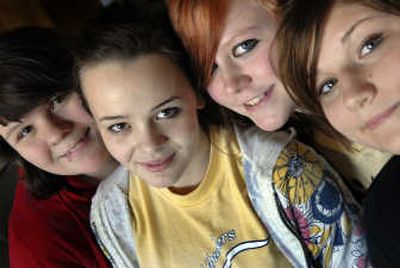Lakes students speak up for Invisible Children

Boys as young as 3 years old struggle to carry guns which are larger than their own small stature. Brainwashed and fed addictive drugs, these young boys are trained to kill.
Girls are abducted and repeatedly raped until they are finally able to escape their captors. For children in northern Uganda, this is their reality. They are called the Invisible Children. For several students at Lakes Middle School in Coeur d’Alene the stories of the Invisible Children have touched them so deeply that they have taken on the responsibility of doing what they can to help others a world away.
“You feel you have to help them,” said Harlie Potts, an eighth-grader These stories and others like it have given Harlie a sense of duty to do what she can to make a difference.
The students first learned about the Invisible Children in their social studies class, where they watched a documentary about the war-torn region of Uganda. Touched by what they saw and with the help of AmeriCorps worker Danielle Monroe, Harlie and some of her classmates began an after school program aimed at raising money and awareness to help the kids who had touched their hearts.
Mandy Chaney, Thea Sanchez and Felicia Strong, are among those who feel they have a responsibility to not only raise money for the children but also raise awareness.
“They almost thought what they saw in the documentary was not real,” said Gwynn Crabtree, the prevention specialist counselor and after-school program coordinator, adding that in her role she feels it is important to enlighten children as to what is going on in other parts of the world, although it may not always be pleasant.
“But when they were enlightened, they had passion for these kids in Uganda,” said Carol Quiring, the Lakes Middle School teacher who directs the Invisible Children after-school program.
Quiring tells a story about some of the Invisible Children known as the Night Walkers. They are alone in their world without any adult supervision. The fear of being abducted during the night forces these children to walk miles and miles to a faraway place, where they sleep huddled together. They return to their village the next day and repeat the long walk each night.
It is just another story that motivates these young teens.
Felicia Strong first learned about the group from her friend Thea Sanchez. Thea invited her to the group and after the initial meeting there was no turning back.
“The first day I saw the documentary and I was automatically hooked,” said Felicia.
The students are specifically part of the Schools For Schools Program for Invisible Children. The program allows students around the world to creatively fundraise to help rebuild the schools in Uganda.
In order to raise money, the students of Lakes Middle School weave bracelets out of hemp and sell them for $5 each. They are also planning a dance for April 11 that will be open to not just students at Lakes, but district wide.
But their goal is not only to raise money, but to help spread the word of the atrocities in Uganda. They produced a documentary of their own which aired on their school news channel.
“It was to raise awareness,” said Harlie, who added that the movie gave factual information about the Invisible Children. They did not speak, but instead wrote the facts on their hands for the camera to record.
“We made a giant human peace sign, too,” said Thea.
Being exposed to what other kids go through on a day-to-day basis has made these young women stop and examine their own lives more closely.
Mandy Chaney said after watching the documentary on the Invisible Children she has a greater appreciation for all she has.
“We are so lucky,” said Mandy. “It’s not really fair. I wanted to do something to help them (the children in Uganda).”
An interesting observation made by Mandy was that in the videos she sees of the children in Uganda, they are always smiling. They have an appreciation for the little things they do have, and that is a lesson all the girls believe society can learn from.
“We complain about things and here they are always smiling,” said Harlie, who admits she is now much less likely to take things for granted.
For Felicia, she said her heart breaks for the kids. “Most kids here have good lives,” said Felicia, “but those kids have nothing. It’s horrible.”
Thea said her dream is to rescue all these children. “It makes me want to take a giant yacht and load up all the kids and bring them to America,” Thea said. “It has made me appreciate what I have.”
But these girls don’t stop thinking about the children when they walk out the school doors. It has impacted their lives in a way they did not expect.
“I’ll be sitting there watching TV, and I’ll stop and think about what is actually happening in Africa at that very moment,” Thea said. “It’s a horrible thought.”